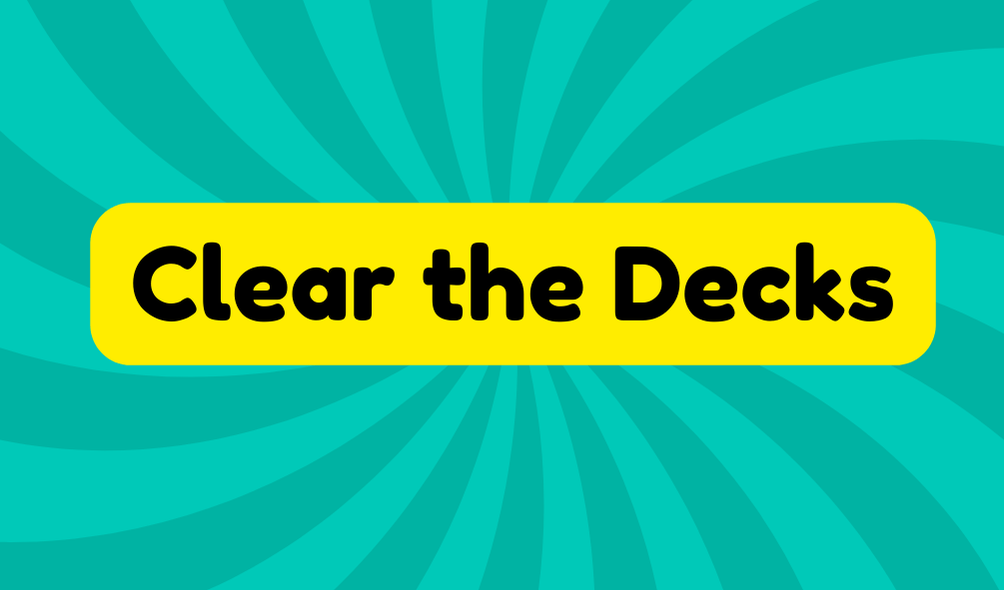"Clear the decks" means to remove distractions and get ready for focused action. This phrase originated in the early 17th century, linked to naval strategy where sailors cleared the deck of obstacles to prepare for battle. In modern contexts, it emphasizes the importance of prioritizing tasks to enhance effectiveness. You might say, "We need to clear the decks before launching this project," highlighting the necessity for focus. Staying organized and disciplined is crucial in today's fast-paced world, reminding you that clearing distractions prepares you for significant challenges ahead. Curious about its usage and relevance today? There's more to explore.
Synonyms
When you're looking to convey the same idea as "clear the decks," several synonyms can serve you well. Utilizing these alternatives can enhance your communication, especially in discussions about task organization and project readiness.
- Streamline
- Prepare
- Unclutter
- Facilitate
These terms emphasize the necessity of eliminating distractions or unnecessary elements that can complicate your path to success. It's vital to realize that simply substituting words doesn't guarantee effective communication; the underlying intent must also resonate with your audience. By knowing and using these synonyms, you equip yourself with a linguistic arsenal that can clarify your goals, push for task organization, and foster project readiness. So consider your choices carefully, as language shapes our actions.
Example of Sentences
Clear the decks serves as a practical phrase in everyday conversation, emphasizing the need to tackle obstacles before commencing on significant tasks. It's vital to understand contextual usage to enhance effective sentence construction. Here are some examples:
- "We need to clear the decks and focus on our target goals."
- "Before launching the new app, let's clear the decks of outdated features."
- "It's essential to clear the decks if we want to innovate effectively."
- "If we don't clear the decks, distractions will hinder our progress."
Origin
The phrase "clear the decks" traces its origins back to the early 17th century, specifically to British sailor John Smith in 1630. This term comes from naval strategy, where ships needed a clean deck for battle, requiring crew members to remove unnecessary items. This act of readiness isn't just about nautical life; it symbolizes a crucial principle relevant to project efficiency today. When you clear out distractions or unimportant tasks, you prepare your team for significant challenges ahead. This historical insight highlights the importance of planning and discipline, reminding you that success often comes from a focused approach. So, don't overlook the power of clearing your decks—history teaches us that readiness is key in any endeavor.
Collocations
While you prepare to tackle significant projects, understanding collocations associated with "clear the decks" can enhance your communication. Recognizing these phrases helps boost your project readiness and task prioritization efforts effectively. Here are some key collocations to bear in mind:
- Clear the decks for action
- Clear the decks of distractions
- Clear the decks before starting
- Clear the decks to move forward
Engaging with these expressions allows you to articulate your intentions more effectively. However, it's crucial to remember that simply using these terms won't guarantee success; actual project readiness comes from diligent planning and prioritization. By focusing on the language you use and its implications, you can ascertain that your communication remains impactful and aligned with your project goals.
How to Use in Everyday Language
Out of the many ways to enhance your daily communication, incorporating "clear the decks" can greatly boost your effectiveness when discussing upcoming projects or tasks. Using this phrase in everyday applications emphasizes your readiness and focus. It's not just a nice saying; it carries motivational significance. When you say you need to "clear the decks," you signal your intent to remove distractions and prioritize what's essential. Instead of getting bogged down by minor issues, adopting this mindset can help you streamline your efforts. Whether in meetings or casual conversations, using "clear the decks" can remind everyone involved what truly matters. Remember, it's about taking proactive steps, making the concept not just a phrase but a practical approach to managing your focus.
Why Is It Still Relevant Today?
In today's fast-paced world, the phrase "clear the decks" remains as relevant as ever for individuals and teams working towards success. As you aim for innovation, project organization becomes important. It's easy to get tangled in unimportant tasks, often losing sight of what truly matters. Clearing the decks isn't just a motivational phrase; it's a call to action. It urges you to prioritize significant projects and eliminate distractions. By being proactive in your planning, you can tackle major tasks with confidence. Without a clear focus, your efforts can easily be wasted on the trivial. Remember, in a competitive landscape, staying organized isn't just helpful; it's critical for achieving your goals. So, clear the decks and step into your next challenge prepared!







